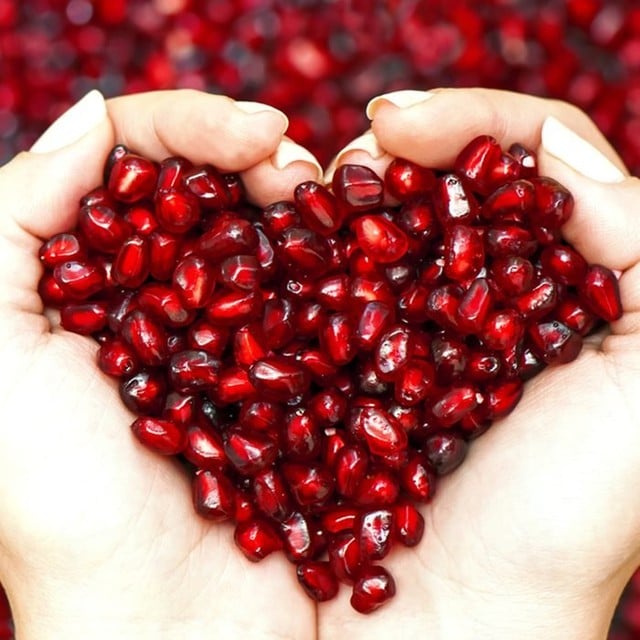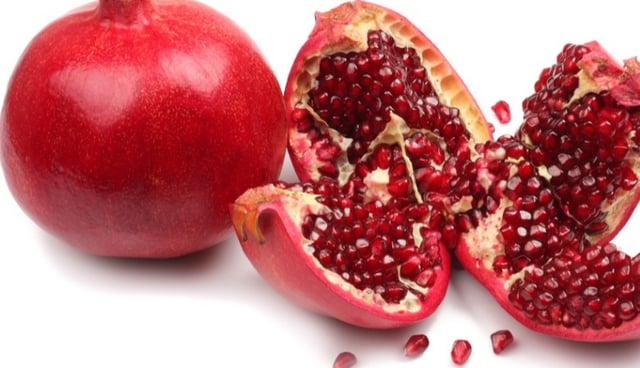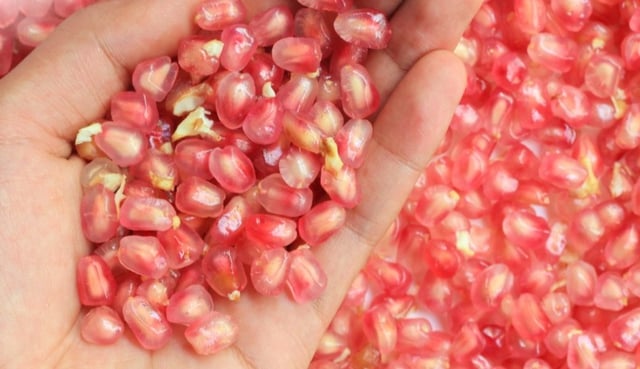Can diabetics eat pomegranates?
Diabetics can eat pomegranates because this fruit has both a low glycemic index (GI) and a low glycemic load (GL).
According to Thanh Nien Newspaper, Nutritionist Ritika Samaddar, Head of Clinical Nutrition and Dietetics Department at Max Healthcare Hospital System (India), said that pomegranate is a fruit that can protect the body from many diseases.
Pomegranates are good for the heart and brain, help diabetics, are high in vitamins A and C and are rich in antioxidants.
The study also showed that punicic acid, methanolic extract from seeds and pomegranate peel extract significantly reduced fasting blood sugar levels.

Pomegranates are loaded with antioxidants - which protect the heart by reducing bad cholesterol levels.
Compounds in pomegranate such as punicalagin, ellagic, gallic, oleanolic, ursolic, uallic acid and tannins are all effective in controlling diabetes.
This means that eating pomegranate (at 100g) is completely unlikely to cause high and rapid blood sugar spikes, making it safe for blood glucose management plans in people with diabetes.
How much pomegranate can diabetics eat?
Diabetics can eat up to 298g of pomegranate at a time. Eating more than this can cause the glycemic load (GL) of the serving to exceed 20 – the limit that increases blood sugar, which is dangerous for diabetics.
Note: Although eating up to 298g of pomegranate at a time is safe for blood sugar levels, this can still potentially cause digestive disorders (stomach pain, heartburn, esophageal reflux, diarrhea) and affect overall health.

Diabetics can eat up to 298g of pomegranate at a time.
Therefore, diabetics should only consume a maximum of 200 - 240g of pomegranate per day, divided into 2 - 3 meals and each meal should be at least 2 hours apart.
In addition, patients need to proactively consult their doctor for instructions on how to calculate the total amount of carbohydrates in their diet.
Because, to get a personalized answer to the question of whether diabetics can eat pomegranates or how much pomegranate they should eat, patients need to consider the total amount of carbohydrates in their diet, and then take measures to increase or decrease the amount of pomegranate they need to consume accordingly.
Are pomegranates good for diabetics?
Eating pomegranates is good for diabetics, as long as they are eaten in moderation (about 80 – 240g/day). The reason is because pomegranates contain many compounds such as anthocyanin, punicalagin and acids such as punicic / ellagic / gallic / oleanolic / ursolic and uallic.
According to research, all of the above compounds are powerful antioxidants, capable of inhibiting chemical reactions that cause oxidative stress in the body, thereby promoting anti-inflammatory properties, an important factor related to the progression of type 2 diabetes.

By reducing inflammation, these compounds have the ability to enhance the function of the pancreas in producing insulin (a hypoglycemic hormone), while increasing insulin sensitivity in cells, thereby helping the body use glucose effectively and supporting blood sugar regulation.
Is it safe for diabetics to eat a lot of pomegranates?
It is not safe for diabetics to eat a lot of pomegranates. The reason is that pomegranates contain a significant amount of carbohydrates (19g/100g), which can be converted directly into glucose in the blood.
Therefore, eating a lot of pomegranates can still cause hyperglycemia, thereby increasing the risk of developing complications related to diabetes, such as cardiovascular disease, kidney failure, retinal damage, foot ulcers, etc.
Source: https://giadinh.suckhoedoisong.vn/qua-luu-tot-cho-nguoi-tieu-duong-neu-an-o-muc-do-duoi-day-172250418234552188.htm










![[Video] More than 100 universities announce tuition fees for the 2025–2026 academic year](https://vphoto.vietnam.vn/thumb/1200x675/vietnam/resource/IMAGE/2025/7/18/7eacdc721552429494cf919b3a65b42e)



















































































![[Infographic] In 2025, 47 products will achieve national OCOP](https://vphoto.vietnam.vn/thumb/402x226/vietnam/resource/IMAGE/2025/7/16/5d672398b0744db3ab920e05db8e5b7d)





Comment (0)